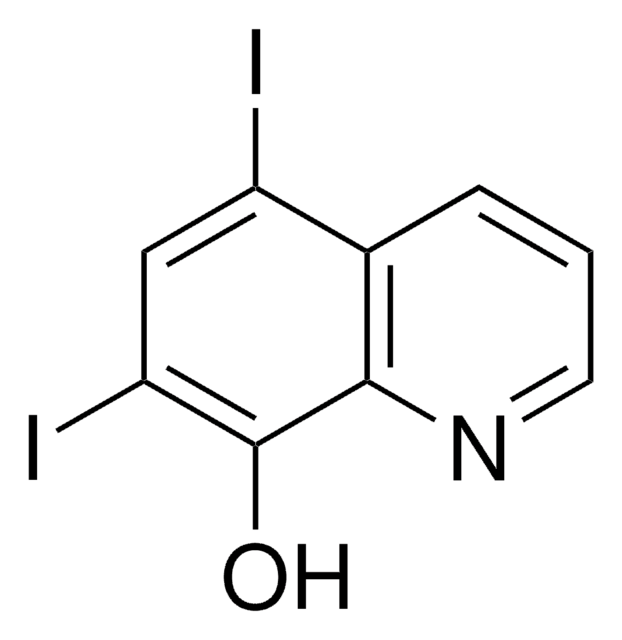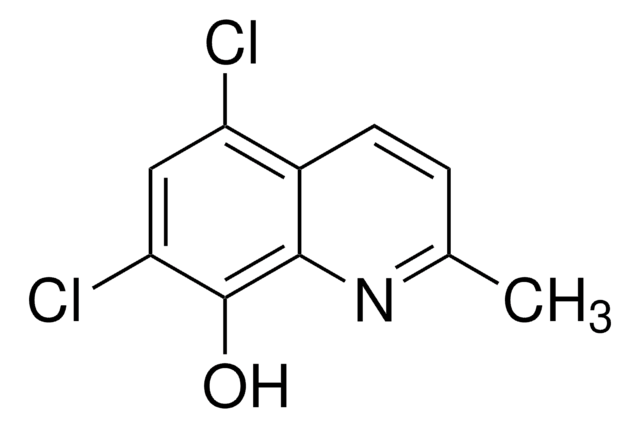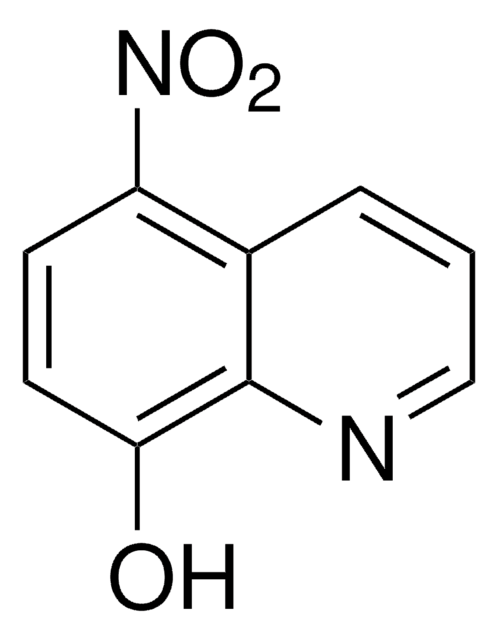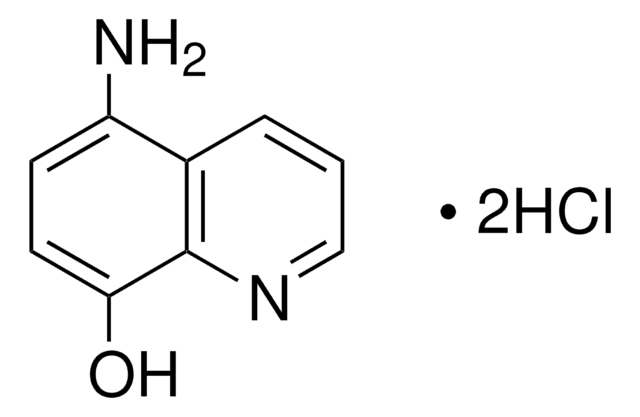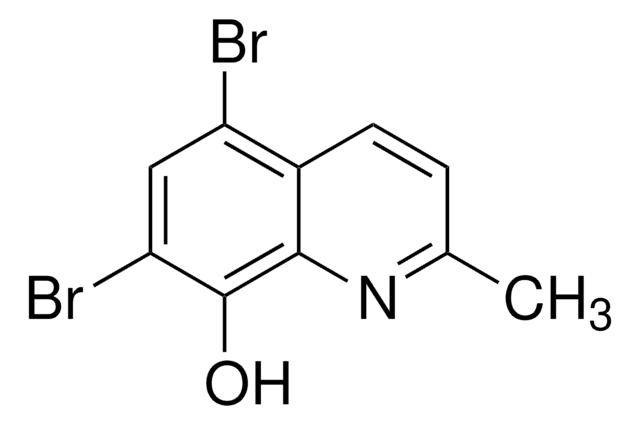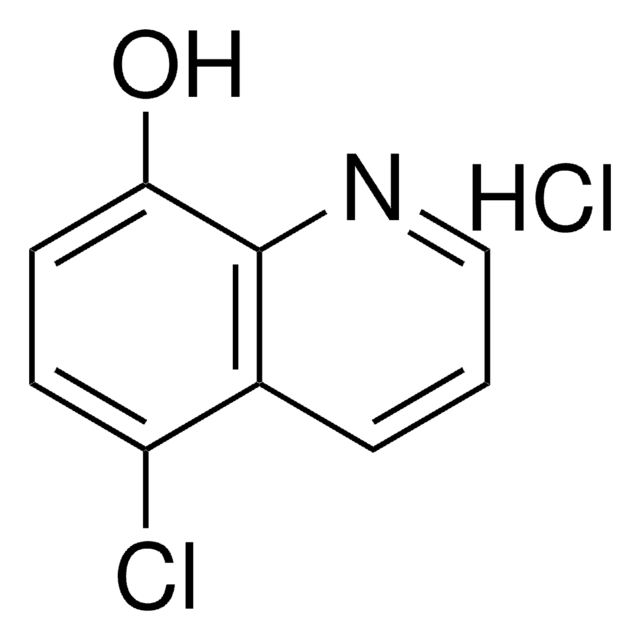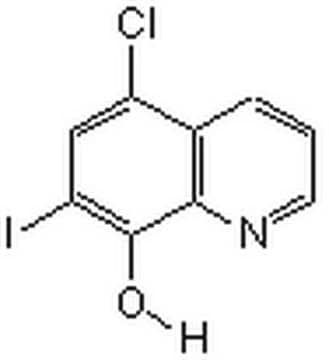D64600
5,7-Dichloro-8-quinolinol
99%
Synonym(s):
5,7-Dichloro-8-hydroxyquinoline, Chloroxine
Sign Into View Organizational & Contract Pricing
All Photos(1)
About This Item
Empirical Formula (Hill Notation):
C9H5Cl2NO
CAS Number:
Molecular Weight:
214.05
EC Number:
MDL number:
UNSPSC Code:
12352100
PubChem Substance ID:
NACRES:
NA.22
Recommended Products
Quality Level
Assay
99%
form
powder
mp
178-180 °C (lit.)
SMILES string
Oc1c(Cl)cc(Cl)c2cccnc12
InChI
1S/C9H5Cl2NO/c10-6-4-7(11)9(13)8-5(6)2-1-3-12-8/h1-4,13H
InChI key
WDFKMLRRRCGAKS-UHFFFAOYSA-N
Looking for similar products? Visit Product Comparison Guide
Signal Word
Danger
Hazard Statements
Precautionary Statements
Hazard Classifications
Acute Tox. 4 Oral - Eye Dam. 1 - Skin Irrit. 2 - STOT SE 3
Target Organs
Respiratory system
Storage Class Code
11 - Combustible Solids
WGK
WGK 3
Flash Point(F)
Not applicable
Flash Point(C)
Not applicable
Personal Protective Equipment
dust mask type N95 (US), Eyeshields, Gloves
Choose from one of the most recent versions:
Already Own This Product?
Find documentation for the products that you have recently purchased in the Document Library.
Customers Also Viewed
Luying Xun et al.
The Journal of biological chemistry, 279(8), 6696-6700 (2003-12-10)
Ralstonia eutropha JMP134 2,4,6-trichlorophenol (2,4,6-TCP) 4-monooxygenase catalyzes sequential dechlorinations of 2,4,6-TCP to 6-chlorohydroxyquinol. Although 2,6-dichlorohydroxyquinol is a logical metabolic intermediate, the enzyme hardly uses it as a substrate, implying it may not be a true intermediate. Evidence is provided to
Effects of chlorhexidine, iodine, and 5,7-dichloro-8-hydroxyquinoline on the bacterial composition of rat plaque in vivo.
M J Schaeken et al.
Caries research, 18(5), 440-446 (1984-01-01)
Miriam Aide Castillo Rodríguez et al.
Journal of pharmaceutical and biomedical analysis, 166, 113-118 (2019-01-15)
A new, rapid, simple and specific method to determine 5-chloro 8-hydroxyquinoline (5-HQ) and 5,7-dichloro 8-hydroxyquinoline (5,7-HQ) stability in swine feed was optimized and validated. A system consisting of an ACQUITY UPLC BEH C18 column (1.7 μm, 2.1 mm × 100 mm), a mobile phase of
[Clinical evaluation on the usefulness of 5,7-dichloro-8-hydroxyquinoline (chloroxine) in association with betamethasone 17-benzoate in the topical treatment of infected cortisone-sensitive dermopathies].
M Negosanti et al.
Giornale italiano di dermatologia e venereologia : organo ufficiale, Societa italiana di dermatologia e sifilografia, 120(2), XVII-XXIII (1985-03-01)
Clarissa J Nobile et al.
Microorganisms, 8(5) (2020-05-24)
Biofilms formed by the human fungal pathogen Candida albicans are naturally resistant to many of the antifungal agents commonly used in the clinic. We screened a library containing 1600 clinically tested drug compounds to identify compounds that inhibit C. albicans
Our team of scientists has experience in all areas of research including Life Science, Material Science, Chemical Synthesis, Chromatography, Analytical and many others.
Contact Technical Service
